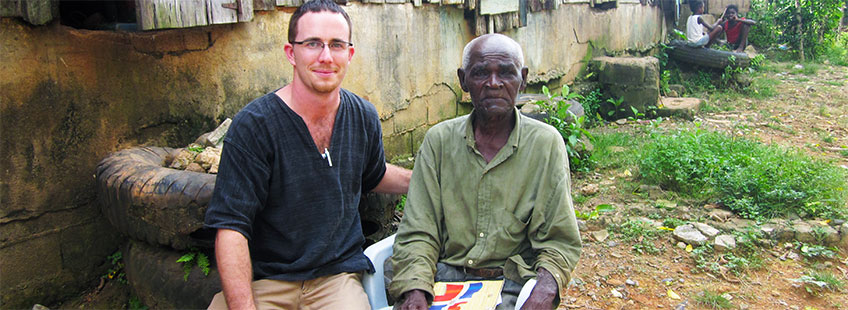Listening to the Voices from the Bateyes
Student David Murphy Publishes Book about HIV in the Dominican Republic

By Mark Couch
(May 2015) In the year before David Murphy entered
This spring, as a fourth-year medical student with an eye on a residency in emergency medicine, he is publishing a book about the lives of the people he met while in the Dominican Republic. After Match Day in March, he returned to the Dominican Republic with 200 copies of the book to distribute at clinics where he worked and to the participants featured in the book.
The Spanish-language book, Voices from the Bateyes: Personal histories of Persons living with HIV/AIDS (PLWHA) in the Dominican Republic, is a compilation of oral histories from the people he met while there.
“Traditionally, a
The voices in the book are haunting. They tell stories of abuse and fear, redemption and hope.
Tami talks about leaving home at 14 and being forced to work as a prostitute, eventually becoming infected with HIV through unprotected sex. She describes returning to see a 21-year-old man who she thinks may have infected her.
“He apologized and asked me to forgive him because he was HIV positive back when he had told me it was something else,” she says. “And I had never seen such a death before, in which a person is reduced to nothing more than teeth with all their hair out and everything.”
Tami has survived and now works as an HIV community health worker. “I have many people in my care, and I have helped lift up everyone—young and old alike,” she says. “I tell people that they can retire from the street life and take care of themselves.”
“The stories are amazing, powerful, unique and provide another perspective about living with HIV,” says Therese Jones,
The goal of the book is to reach people with HIV and AIDS to help them through the psychological process of acceptance, which is a fundamental step to successful medical treatment. There are an estimated 1,200 persons living with HIV in the Dominican province of Monte Plata, yet just 650 receive care in the province’s four HIV Units.
Murphy plans to distribute the books to clinics and health staff in the Dominican Republic, to the Provincial Ministry of Health, and the larger community, including the United Nations HIV office.
While in medical school, Murphy has continued to work internationally.
Between his first and second year, Murphy spent six weeks in a public emergency department in Cape Town, South Africa, as part of the South African Emergency Medicine Foundation, led by David Richards, MD, an assistant professor of emergency medicine who practices at Denver Health. While there, Murphy delivered a baby in the field and helped treat cases of meningitis, tuberculosis, HIV/AIDS. He says he also witnessed innumerable trauma and community assault causes that “left an indelible impression of daily physical and social struggle in the townships.”
Murphy says he wants to pursue emergency medicine because it is “a field that turns no one in need away.”
“The profound relationships that I formed while conducting these interviews in the Dominican Republic taught me that the duration and frequency of interaction